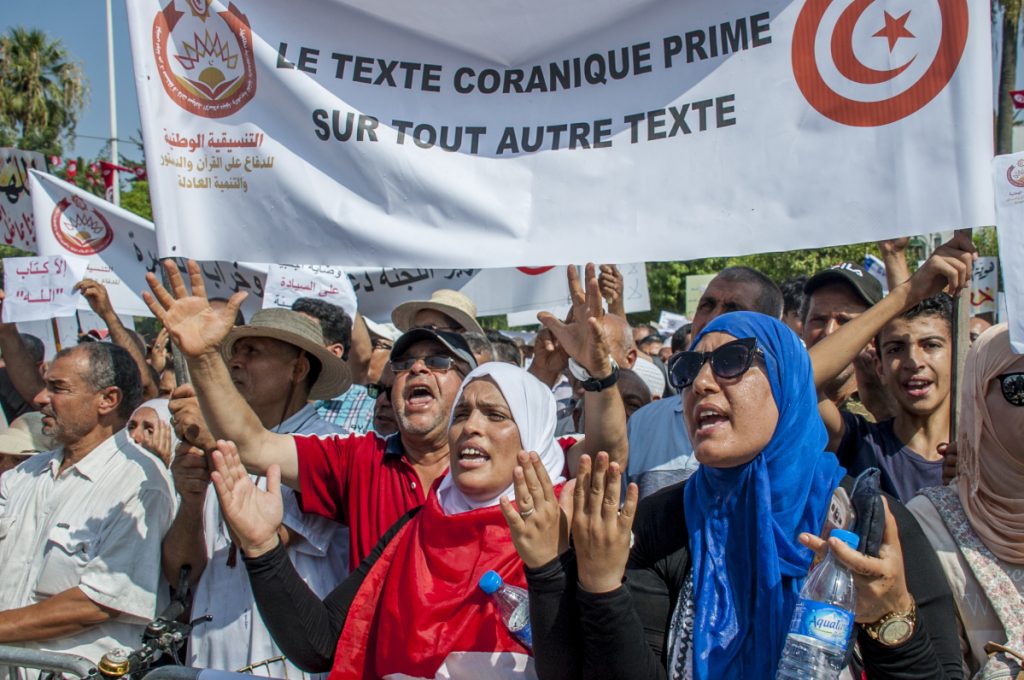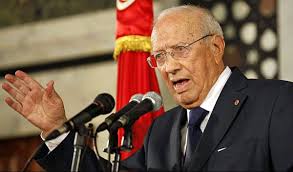Tunisia is starkly divided on whether to repeal its anti-gay law. In favor: a presidential commission and human rights organizations. Opposed: thousands of protesting conservative Muslims.

Protesters carry a banner reading “Quran text before any other text” outside the Tunisian capital of Tunis on Aug. 11. (Hassene Dridi photo courtesy of the Associated Press)
The Associated Press reported on the protest:
BARDO, Tunisia — Thousands of Muslim fundamentalists protested Saturday [Aug. 11] in front of the nation’s parliament to decry proposals in a government report on gender equality that they claim are contrary to Islam.
Men and veiled women marched under a blazing sun from Tunis to Bardo, outside the capital where the parliament is located, to protest the report by the Commission of Individual Liberties and Equality. The report, among other things, calls for legalizing homosexuality — now punishable with three years in prison — and giving the sexes equal inheritance rights. Men now receive double the inheritance of women.
The commission was put in place a year ago by President Beji Caid Essebsi, who is expected to speak about it on Monday [Aug. 13], Women’s Day in Tunisia. It was not immediately clear whether the proposals would eventually be put before parliament.
[On Monday, Essebsi endorsed the proposal to give women equal inheritance rights, but avoided discussion of Tunisia’s anti-LGBT law.]
The protest was organized by the National Coordination for the Defense of the Koran, the Constitution and Equitable Development, and protesters defended a literal reading of the Koran, the Muslim holy book.
Tarek Azouz worried that the proposals amounted to a “wish to destroy moral values” by legalizing homosexuality. If acted upon, he said, “we’ll end up with gay marriage.”

Tunisian President Beji Caid Essebsi (Photo courtsy of Nairaland.com)
Dozens of human rights advocates urged Essebsi to follow the commission’s recommendation. This is their petition:
TO: Beji Caid Essebsi, President of the Republic of Tunisia.
Your Excellency,
On 13 August 2017, you appointed the Commission on Individual Freedoms and Equality and tasked it with recommending “reforms linked to individual freedoms and equality, deriving from the provisions of the January 27, 2014 Constitution, international human rights standards and new trends in the fields of liberties and equality.”
In their report, published on 12 June 2018, the Commission clearly recommended repealing penal code article 230, which criminalises homosexual acts, and banning anal tests, a discredited method used forensically on men suspected of being gay.
In 2017, there were at least 71 arrests under article 230 – literally days ago, a young man was sentenced to 4 months in jail for exchanging romantic messages online with another man. Article 230 fuels discrimination and violence – and it’s time to put an end to it.
President Beji Caid Essebsi, we are calling on you to seize this significant opportunity to introduce legislation that would abolish Article 230 of the Tunisian Penal Code and prohibit anal testing.
This legislation is key to meet the requirements of the 27 January 2014 Constitution of Tunisia and to harmonize its legislation with international human rights standards.
Yours Faithfully,
Mounir Baatour, Shams – Pour la dépénalisation de l’homosexualité en Tunisie
Matt Beard, All Out
Anastasiia Danilova, GENDERDOC-M Information Centre, Moldova
John O’Doherty, The Rainbow Project, Ireland
Leonardo Monaco, Associazione Radicale Certi Diritti, Italy
Costa Gavrielides – Adviser for Multiculturalism, Acceptance and Respect for Diversity to the President of Cyprus.
Vladimiras Simonko, Asociacija LGL, Lithuania
Sebastiano Secci, Mario Mieli | Circolo di Cultura Omosessuale, Italy
Edwin Sesange, African Equality foundation, the UK
Frank Mugisha, Sexual Minorities Uganda – SMUG
Maxwell W. Monboe, Liberia’s Initiative for the Promotion of Rights,Identity Diversity and Equality (LIPRIDE), Liberia
Ifeanyi Orazulike, International Center for Advocacy on Right to Health – ICARH, Nigeria
Françoise Mukuku, Si jeunesse savait, Republique Democratique du Congo
Lana Gobec, Legebitra, Slovenia
Luswata Andrew Brant, IceBreakers Uganda
Hazan Kahrizi, Alwan for LGBT rights in the Middle East and North Africa, Iraq
Amir Mukambetov, LGBT organization Kyrgyz Indigo, Kyrgyzstan
Akudo Oguaghamba – Women’s Health and Equal Rights Initiative, (WHER) Nigeria
Alexandre Marcel, Comité idaho, France
Steve Letsike, Access Chapter 2, South Africa
Busingye Louis, Human Rights First Rwanda Association, Rwanda
Frederic Hay, ADEHOS, France
Olfa Youssef, universitaire et islamologue, Tunisie
Symmy Larrat, ABGLT, Brazil
Karim Belhadj, cinéaste, Tunisie
Paul Dillane, Kaleidoscope Trust, the UK
Ruth Muganzi, Kuchu Times Media Group, Uganda
Qwin Mbabazi Fiona and Fokeerbux Najeeb Ahmad, African Queer Youth Initiative
Jérémie SAFARI, Rainbow Sunrise Mapambazuko Democratic Republic of the Congo
Ronald Céspedes, Fundación Diversencia, Bolivia
Olivier King SIBO, MOLI, Burundi
Ivan Hinton-Teoh, just.equal, Australia
Mitch Yusof, SEED, Malaysia
Wei-Cheng Lin, Taiwan Tongzhi (LGBTQ) Hotline Association, Taiwan
Nkali Biggie, FARUG, Uganda
Midnight Poonkasetwattana, APCOM, Thailand
Joey Siosaia Joleen Mataele, Tonga Leiti’s Association, Kingdom of Tonga
Hadi Damien, Beirut Pride, Lebanon
Celestine Peter, lawyer, Tanzania
Muriel Yvon, Collectif Arc en Ciel, Mauritius
Jinan Limam, ADLI, Tunisie
COMMENTS